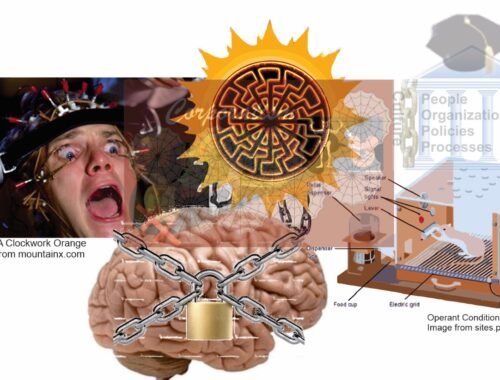
Virtue and Pandora’s Box: Effective Policy
I’ve been contemplating virtue quite a bit lately and a comment about the origins of Steampunk. I started reading steampunk well before it was a popular meme. I recall an essay I read on the origins of steampunk and its Victorian setting. The essay, by one of the early steampunk authors, said they picked the Victorian setting because of its seeming virtue. That society had moved so far away from virtue, they used the Victorian setting to restore a sense of virtue. But the Victorian virtue hurt many people as well. For a moment, consider an unwed mother. The Victorian ethos punished her and her child, but not the father. It was a hellish punishment for the woman and child, but it seemed to keep a lid on out-of-wedlock births. That term, “keeping a lid on it” guided me to Pandora’s Box.
According to Hesiod, Pandora was a curse on mankind as retribution after the Titan Prometheus stole fire and gave it to humans. Zeus had Hermes hammer the first human woman—Pandora—out of the earth. Hermes made her lovely as a goddess, with the gift of speech to tell lies, and the mind and nature of a treacherous dog. Athena dressed her in silvery clothing and taught her weaving; Hephaestus crowned her with a marvelous golden diadem of animals and sea creatures; Aphrodite poured grace on her head and desire and cares to weaken her limbs.
Set aside the misogynistic comments for a moment and focus on the relationship between Pandora and Prometheus. Prometheus gave humans the gift of fire. Zeus punished him by chaining him to a mountain with an eagle constantly eating his liver, which regenerated every day. Pandora and her box were punishment to humans for this gift, which led to humanity being far less dependent on the Olympian gods. When humans opened Pandora’s Box, they unleashed the ills of the world. But hope was also in the box…
The question is, how do we operationalize hope and make it work?
Good people with good intentions can do great ill when they let biases and non-critical thinking govern their actions. Milton Friedman wrote, “One of the great mistakes is to judge policies and programs by their intentions rather than their results”. A byproduct of the social champions that sought to free women and children from the stigma of unwed mothers created an explosion of unwed mothers and poor families, as shown by the census data. Likewise, the well-meaning champions of sobriety helped to fund organized crime when the 18th Amendment to the Constitution prohibited the manufacture and sale of alcohol in the US.
Likewise, evil intentions can be cloaked in seemingly good actions. President Johnson reportedly said, “I’ll have those n*ggers voting Democratic for 200 years.” Regardless of whether he ever said it, as I discussed in several blogs (Part 7: The Great Society, Creating the Monster: The American Bureaucracy, Critical Thinking and Policy: The Wars on Drugs and Poverty), the effect of the Great Society was two-fold:
- Blacks overwhelmingly support the Democratic party.
- Perhaps $22 trillion later, the black community is poorer and potentially worse off on multiple dimensions than they were in 1963.
Does this mean we cannot operationalize hope? Does it mean that Pandora’s Box is just around the corner of every policy decision? I hope not. But what it means is that policy decisions and government programs that implement them must be thoroughly studied and war gamed. Policy, as I discussed in Critical Thinking and Policy Development and Analysis, requires critical thinking and an understanding of the cognitive biases on all sides of the issue. This is especially true when well-intention people try to address significant social issues. The wrong cure can be worse than the disease. But as a pragmatist, I think people that really want to solve a problem, and not just get wealthy and gain power from an approach, can work together to find effective solutions.
But that also means that we need to be clear minded about assessing the solutions we implement. We need to keep Friedman’s injunction in mind at every step of policy development and assessment. We must impartially assess policies at every step of the process, to include post-implementation. Many of these are wicked problems with entrenched path dependencies, that may require some form of punctuated equilibrium to break the path. The citizens of the Republic need to ensure we have effective policies that solve problems rather than create new ones.
Clearly, there are social ills that we need to address in our society. But we need to ensure that we are helping those that need it and not just lining the pockets and increasing the power of politicians, bureaucrats, and self-appointed advocates. The poor and the weak in our society need real advocates that seek and implement effective solutions based on facts and critical thinking.
We don’t need to open Pandora’s Box with every problem. Hope needs virtue.




